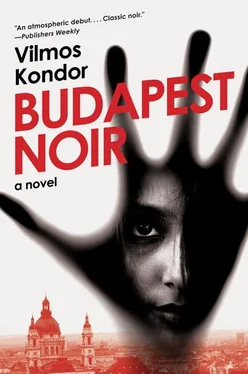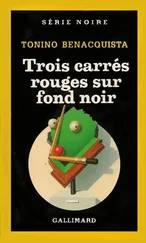“That’s it?” Gordon looked at her. “Anything else?”
Margo shook her head. She stood and walked over to the little table once again, pouring herself another gin in a clean glass. Leaving out the lemon this time, she gulped the gin down. “There’s one more thing.”
“What would that be?”
“Whenever we had coffee, she always asked where we bought the beans. One time Manci didn’t buy the coffee at Meinl, like usual, but at Arabia instead. ‘I don’t want any of that,’ said Judit. ‘It’s the same coffee,’ we told her. She looked at me and declared, ‘I don’t drink that stuff.’ She crumpled up the paper she’d been reading and stormed out of the kitchen.”
“That’s it?” asked Gordon.
“That’s it,” replied Red Margo.
“There’s nothing else you know?”
“I told you everything I know. Too much at that.”
Gordon stood. “No. Just enough.”
“Are you trying to say you already know who killed the girl?”
“Not yet. I still need to clear up one or two things to figure it out.”
“Who is it? Who?” Red Margo snapped, completely sober. She seized his coat by the lapels. “Tell me who killed her!”
“I don’t know yet.”
“Be a good boy!”
“Not yet.”
The woman let go of his coat, crossed her arms behind her back, and laughed in his face.
“Fine then. Keep it to yourself. Just go ahead and try figuring out what’s true of what I said.”
“No matter what’s true,” said Gordon, looking at Red Margo, “thanks all the same. For the gin, too.” He turned and went toward the door. The woman stood by the window and didn’t even look his way. Gordon shut the door behind him and was already at the stairwell when Red Margo called after him. “Wait a second, Mr. Journalist.”
Gordon stopped and turned around. “For what?”
“There’s one more thing.”
“What?”
“Do you want to know?”
“What?”
Through half-shut eyes, Red Margo looked at Gordon. “You’re the one here playing detective, isn’t that right?”
“Go ahead,” said Gordon, returning to the door, “tell me.”
“Wait here,” replied the woman, and she slammed the door shut.
Gordon waited. Minutes passed. He lit a cigarette. Finally, Margo appeared with a letter in her hand. “I just remembered this letter.”
“A letter.”
“That’s right.”
“And you just thought of it.”
“Just now. If you don’t believe me or if you aren’t interested . . .”
“What is it you want?” asked Gordon, exhaling smoke.
“Nothing,” said Margo, leaning up against the doorjamb. “Nothing from you.”
Gordon crossed his arms over his chest and looked at the woman.
“This is a love letter,” said Margo.
Gordon held out his hand. The woman dropped the letter in. “It slipped out of her purse one time.”
“And you picked it up.”
“I wanted to give it back to her, but I didn’t have the chance.”
Gordon didn’t say a thing. He slipped the letter into the pocket of his blazer and started toward the stairs. The woman once again called after him. “You don’t know what you’ve got yourself mixed up in.”
Gordon turned around.
“You don’t know,” Margo repeated, “what you’ve got yourself mixed up in. These folks don’t kid around. Keep an eye out behind you.” With that, she slammed the door shut and disappeared.
Gordon shrugged. What could they do to him? And who did he have to watch out for? Would they shoot him? This was Budapest, not Chicago.
Leaving the building, Gordon turned left, toward Crown Prince Rudolf Square. The moment he arrived on the Grand Boulevard, he was struck by an icy wind off the Danube. He shuddered. Looking toward the Margaret Bridge, he saw dark clouds gathering in the sky. Gordon pulled his overcoat tight around him and walked over to the tram stop. The Comedy Theater was lit up, off in the distance, with expensive cars parked out front. The wind died down for a moment, and he heard music filtering out of a nearby coffeehouse.
The tram rolled to a stop with bells clanging. Gordon hopped aboard and got off on Berlin Square. As always, there was quite a crowd at the West Railway Station. The massive edifice seemed to pour out those freshly arrived and suck in those preparing for their journeys. Gordon stopped in the middle of the square beside a large concrete kiosk topped off by a clock prominently bearing the name of its sponsor, the Italian firm Modiano. From there, he looked back at the tram stop. He felt as if he was being followed. But no one looked suspicious. Not that he knew, of course, who might have counted as suspicious at this hour. Young men were waiting in front of the Westend Hotel, brooding away as they wondered if they could afford sixty pengős a month for a room or if they should move a bit farther from downtown, where they might get by on a bit less. A big poster in front of the Jolly Bar carried an ad for “Berta Türke’s Schrammelmusik Band Playing Tonight.” Gordon shook his head. Was there a night when they didn’t play? Berlin Square had a charm of its own, what with its ever-present mass of humanity, its trams and their constant clinging and clanging, its shouting cabbies, whistling policemen, and sundry spectacle of civil servants making their way from month-to-month rooms to the nearest bar, poor young boys from the provinces, and men who’d just left their wives for good. Inside the kiosk, right below the Modiano clock, was a tobacconist’s shop. Gordon often bought cigarettes there, and the wounded veteran behind the counter gave him a cheery welcome even now.
“Mr. Editor! The usual?”
“Let’s have it,” said Gordon, slipping the pack of Turkish cigarettes into his pocket at once. “How goes business, Krámer?”
“Don’t remind me,” said the scruffy fellow with a resigned wave of the hand. “I’m sure Finance Minister Fabinyi is doing what he thinks best, you know, but it’s us who get the raw end of the deal again.”
“You mean that new rule making it illegal to loan out newspapers?”
“That wasn’t the problem, sir. A gentleman would come in, ask for some tobacco, and skim the paper. No, I had no problem with that. Why, I even let regulars look at a paper or magazine for just a couple of fillérs.” He shook his head before continuing in a newly dignified tone: “But if I got it back all torn up, he had to pay! I’m not saying it added up to much every month, just a couple pengős—okay, let’s say ten. Now we can’t do it. Now folks can’t just page through the papers, you know, because it’s been banned from the top.”
Gordon gave a commiserating nod, then left the shop. He walked along Teréz Boulevard to Podmaniczky Street, turned, and followed that to Jókai Street. Mouthwatering aromas streamed out of a hash house on the corner of Horn Street, and Gordon nearly went inside, but he’d had enough for one day. He was exhausted, and he wanted to get home as soon as possible. Lovag Street was quiet at first, but as he approached Nagymező Street, the cacophony of sounds of Budapest’s Broadway grew ever more intense. He looked at his watch. It was just past seven. He had just enough time to wash up and change. A Night at the Opera started at eight at the West Motion-Picture Theater, which was at the start of the Erzsébet Boulevard stretch of the Grand Boulevard. Gordon was not ashamed that he liked the Marx Brothers; nor was it by chance that he made an effort to watch the Fox International newsreel at least once a week. True, the constant war reporting from Spain and Abyssinia was a bit boring already, but sometimes there was a story from America. The other day, for instance, President Roosevelt—
Читать дальше
Конец ознакомительного отрывка
Купить книгу












